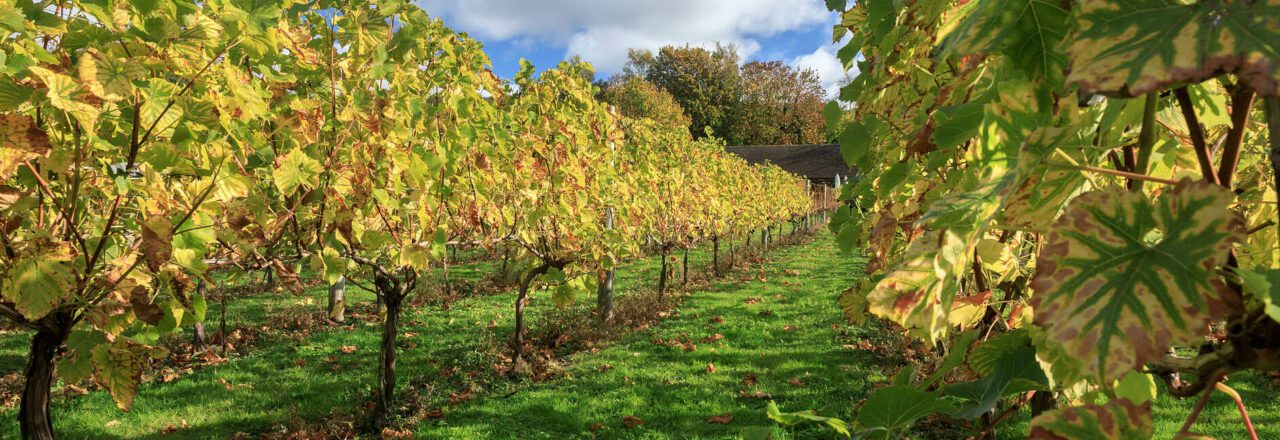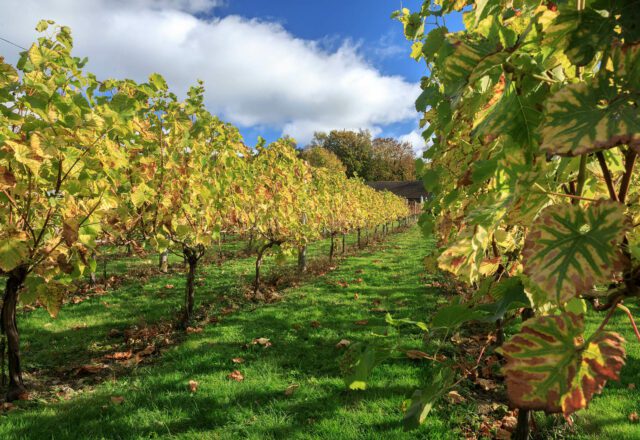The Kent Downs National Landscape team is helping Defra design the new Environmental Land Management Scheme. We ran three Tests and Trials covering Viticulture (grape-growing), Accessibility, and Natural Flood Management and invited farmers and landowners to participate and help co-design them. The evidence and recommendations from these Tests and Trials were submitted to Defra in 2021 and will help shape the way payments are made to farmers and landowners from 2024 onwards.
Over the last 15-years there has been a significant increase in vineyard area in the UK of more than 300% to over 700 vineyards covering circa 3500 hectares (ha). Now there are 36 vineyards in the Kent Downs (or in the setting).
This increase represents one of the most remarkable successes of land use diversification and rural enterprise in the UK in recent decades. Underpinned by climate change and supported by investment, training and recognition for high-quality wine production, the sector looks set for further expansion.
Beyond benefits to rural economies viticulture and wine production offer opportunities for greater ecosystem services net gains. Vineyards have excellent potential to deliver public goods because the actual land area within a vineyard that is planted with vines is only circa 15–20% of the total area.
However, vineyards also affect landscape character and the environment, and have potential for harm within protected landscapes. Scale and location is a major factor for the integration of vineyards, particularly in open Downland. Where contained by rolling topography, woodland blocks and field boundary hedgerows – all elements characteristic of much of the AONB – their integration is far more successful. The tipping point, in terms of scale and impact, remains unquantified and requires a landscape capacity assessment.
Opportunities for vineyards to enhance public goods through an increase in biodiversity (thriving wildlife and plants), mitigation and adaptation to climate change, and the delivery of beauty, heritage and engagement are significant.
This short study assesses key Landscape Character Type impacts from viticulture and opportunities for mitigation, and it sets the context and background to evaluating where public goods could be enhanced.
Read the Full Report
Viticulture Final Report (PDF, 3 MB)
Appendices
Appendix I – Viticulture Test and Trial – Summary of Workshops March 2020 (PDF, 454 KB) Appendix II – Viticulture Test and Trial – Summary of Workshops Autumn 2020 (PDF, 2 MB) Appendix III – Viticulture Test and Trial – Summary of Workshops February 2021 (PDF, 1 MB) Appendix IV – Viticulture Test and Trial – Summary of One to One Interviews summer 2020 (PDF, 2 MB)
Appendix XII – Viticulture Test and Trial Draft Recommendations. October 2020 (PDF, 1 MB)
Appendix XV – Viticulture Test and Trial Row Fruit Final Report – April 2021 (PDF, 4 MB)
Appendix XVI – Viticulture Test and Trial Questionnaire Report – May 2021 (PDF, 1 MB)
Appendix XVII – Viticulture Test and Trial Case Studies – June 2021 (PDF, 4 MB)
This report is a collaboration with expert consultants in both nature conservation and viticulture: White Horse Ecology and Vinescapes



